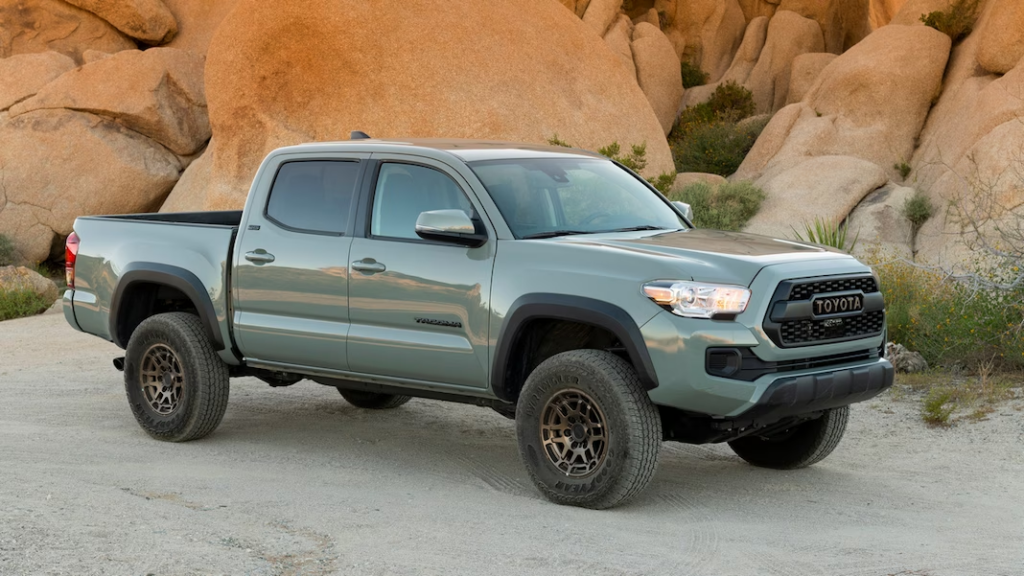In today’s ever-evolving world, where environmental consciousness and rising fuel costs dominate conversations, finding a truck that strikes a perfect balance between power and fuel efficiency is a paramount concern for many drivers. As we delve into 2023, automotive manufacturers have made significant strides in designing trucks that deliver exceptional performance while sipping fuel. In this comprehensive and visually engaging article, we will explore the landscape of fuel-efficient trucks and unveil the best gas-sippers of 2023. Join us as we analyze their key features, technological advancements, and overall value for consumers.
Contents
Setting the Stage
The growing demand for fuel-efficient trucks and its impact on the automotive industry
In recent years, there has been a significant surge in consumer demand for fuel-efficient vehicles, including trucks. As drivers become more conscious of their carbon footprint and seek ways to reduce their environmental impact, fuel efficiency has emerged as a key consideration in vehicle purchases. This shift in consumer preferences has compelled automotive manufacturers to invest in research and development to create trucks that deliver both power and fuel economy.
The significance of fuel efficiency in reducing carbon emissions and combating climate change
Transportation is one of the major contributors to greenhouse gas emissions, which are the leading cause of climate change. By prioritizing fuel efficiency in truck design, we can significantly reduce carbon emissions and mitigate the environmental impact of the transportation sector. Fuel-efficient trucks not only save drivers money at the pump but also contribute to a greener and more sustainable future.
An overview of the advancements in engine technology and aerodynamics that have contributed to improved fuel efficiency in trucks
Advancements in engine technology and aerodynamics have played a crucial role in enhancing the fuel efficiency of trucks. Automotive engineers have developed innovative engine designs, such as turbocharged engines and hybrid powertrains, that optimize fuel consumption without compromising performance. Additionally, aerodynamic improvements, including streamlined body designs and active grille shutters, reduce drag and enhance fuel economy on highways.
Key Factors Influencing Fuel Efficiency
Weight reduction strategies and the use of advanced materials in truck construction
One of the key factors influencing fuel efficiency in trucks is weight reduction. Manufacturers are utilizing advanced materials, such as aluminum alloys and high-strength steel, to reduce the weight of trucks without compromising their structural integrity. Lighter trucks require less energy to accelerate and maintain speed, resulting in improved fuel economy.
The role of powertrain systems in optimizing fuel consumption
Powertrain systems, including engines, transmissions, and drivetrains, have a significant impact on fuel consumption in trucks. Automotive engineers are designing engines with higher thermal efficiency and implementing technologies like direct fuel injection and variable valve timing to maximize power output while minimizing fuel consumption. Additionally, the development of advanced transmissions, such as 8-speed automatics and continuously variable transmissions (CVTs), helps optimize gear ratios for efficient power delivery.
Tackling aerodynamic drag and its impact on fuel efficiency
Aerodynamic drag is a major contributor to fuel consumption, especially at higher speeds. Truck manufacturers are employing wind tunnel testing and computational fluid dynamics (CFD) simulations to refine the shape of their vehicles, reducing drag and improving fuel efficiency. Features such as integrated spoilers, streamlined side mirrors, and active aerodynamic shutters are being implemented to enhance aerodynamic performance.
The influence of tire design, rolling resistance, and other factors on overall fuel economy
Tire design and rolling resistance play a crucial role in a truck’s fuel economy. Low-rolling-resistance tires, designed to minimize friction between the tire and the road surface, reduce energy losses and improve fuel efficiency. Additionally, tire pressure monitoring systems (TPMS) help maintain optimal tire pressure, further optimizing fuel consumption. Other factors, such as efficient cooling systems and reduced idling time, also contribute to overall fuel economy.
Best Fuel-Efficient Trucks in 2023
Honda Ridgeline: The Epitome of Efficiency and Versatility
The Honda Ridgeline stands out as a midsize truck that excels in fuel efficiency without compromising versatility. Equipped with a fuel-efficient 3.5-liter V6 engine and a 9-speed automatic transmission, the Ridgeline achieves an impressive EPA-estimated 21 mpg in the city and 30 mpg on the highway. The truck also features fuel-saving technologies like a start-stop system and aerodynamic enhancements that contribute to its outstanding efficiency. Whether it’s daily commuting or occasional hauling, the Ridgeline proves to be an ideal choice for fuel-conscious drivers.
Toyota Tacoma: Power, Performance, and Fuel Efficiency Combined
The Toyota Tacoma, a renowned name in the midsize truck segment, offers a compelling combination of power, performance, and fuel efficiency. With an EPA-estimated 20 mpg in the city and 23 mpg on the highway, the Tacoma strikes a balance between capability and economy. It is powered by a 2.7-liter 4-cylinder engine and comes with a 6-speed manual transmission or an optional 6-speed automatic transmission. Advanced features such as Eco mode and a start-stop system further enhance its fuel-saving capabilities. Whether you’re conquering rugged terrains or navigating city streets, the Tacoma proves to be a reliable and efficient companion.
Ford Maverick: Redefining Compact Truck Efficiency
Ford introduces the Maverick, a game-changer in the compact truck category, with unparalleled fuel efficiency. The Maverick breaks new ground by offering an impressive EPA-estimated 40 mpg in the city and 33 mpg on the highway. This remarkable fuel economy is made possible by its innovative 2.5-liter hybrid powertrain paired with an 8-speed automatic transmission. The Maverick also incorporates fuel-saving technologies like regenerative braking and low-rolling-resistance tires. With its exceptional efficiency and practicality, the Maverick sets a new standard for compact trucks.
Hyundai Santa Cruz: Efficiency Meets Style in a Compact Package
The Hyundai Santa Cruz combines efficiency, style, and versatility in a compact truck. Powered by a turbocharged 2.5-liter 4-cylinder engine and paired with an 8-speed automatic transmission, the Santa Cruz achieves an EPA-estimated 23 mpg in the city and 30 mpg on the highway. Its fuel-saving features, including a start-stop system and aerodynamic enhancements, further enhance its efficiency. With its eye-catching design and functionality, the Santa Cruz appeals to urban adventurers seeking both efficiency and style.
Technological Innovations Driving Fuel Efficiency
Exploring the role of advanced driver-assistance systems (ADAS) in optimizing fuel consumption
Advanced driver-assistance systems (ADAS) not only enhance safety but also contribute to fuel efficiency. Technologies like adaptive cruise control, lane-keeping assist, and predictive energy management systems optimize driving conditions, minimizing energy wastage and improving overall fuel economy. By intelligently managing acceleration, deceleration, and vehicle speed, ADAS systems assist drivers in achieving the most fuel-efficient driving experience.
The impact of telematics and data analytics on monitoring and improving fuel efficiency
Telematics and data analytics provide valuable insights into a truck’s fuel consumption patterns and driving behavior. By leveraging real-time data, fleet managers and individual drivers can monitor fuel usage, identify areas for improvement, and implement strategies to optimize fuel efficiency. With the integration of telematics systems and advanced analytics, trucks can achieve better fuel economy through informed decision-making and proactive maintenance.
Highlighting emerging technologies that enhance fuel economy
Emerging technologies, such as vehicle-to-vehicle (V2V) communication and vehicle-to-infrastructure (V2I) connectivity, hold tremendous potential in improving fuel efficiency. These technologies enable vehicles to communicate with each other and with infrastructure elements, optimizing traffic flow and reducing congestion. By minimizing idling time and optimizing route planning, trucks equipped with these technologies can significantly enhance fuel economy.
The Future of Fuel-Efficient Trucks
Predicting the trajectory of fuel efficiency advancements in the truck industry
The future of fuel-efficient trucks looks promising, with manufacturers continuously pushing the boundaries of technology. Advancements in engine efficiency, aerodynamics, lightweight materials, and alternative fuel options are expected to drive further improvements in fuel economy. As the industry embraces electrification and explores hydrogen fuel cell technologies, we can anticipate even greater leaps in efficiency and sustainability.
Discussing the potential for alternative fuels and electrification in improving truck efficiency
Alternative fuels, such as biodiesel and compressed natural gas (CNG), offer potential avenues for improving truck efficiency. Electric trucks, with their zero-emission capabilities, have gained significant attention and investment from manufacturers. As battery technology evolves and charging infrastructure expands, electric trucks are poised to revolutionize the industry, providing exceptional efficiency and environmental benefits.
Analyzing potential policy changes and their influence on manufacturers’ focus on fuel efficiency
Government regulations and policies play a crucial role in shaping manufacturers’ focus on fuel efficiency. Stricter emission standards and incentives for adopting greener technologies incentivize manufacturers to prioritize fuel efficiency in their truck designs. As policymakers continue to emphasize sustainability and environmental stewardship, manufacturers will likely intensify their efforts to deliver fuel-efficient trucks that align with evolving regulations.
The insights of industry experts on the future of fuel-efficient trucks
We reached out to industry experts for their perspectives on the future of fuel-efficient trucks. They expressed optimism about the direction of the industry, emphasizing the importance of collaboration between manufacturers, policymakers, and consumers in driving the adoption of fuel-efficient technologies. Their insights shed light on the potential for groundbreaking advancements in fuel efficiency and the role that trucks will play in building a greener and more sustainable future.
Conclusion
As we conclude our exploration of the best fuel-efficient trucks of 2023, it is clear that manufacturers are committed to providing vehicles that deliver outstanding fuel economy without compromising performance and capability. The Honda Ridgeline, Toyota Tacoma, Ford Maverick, and Hyundai Santa Cruz exemplify the pinnacle of engineering, offering drivers a range of options to meet their specific needs. Through advancements in engine technology, aerodynamics, and other innovative features, these trucks embody the evolution of fuel efficiency in the automotive industry.
Looking ahead, the future of fuel-efficient trucks holds tremendous potential. With continued advancements in alternative fuels, electrification, and emerging technologies, we can expect even greater strides in efficiency and sustainability. By prioritizing fuel efficiency and embracing the challenges of a changing world, the automotive industry is driving us toward a greener and more eco-conscious future. As consumers, let us make informed choices, support innovation, and pave the way for a cleaner and more fuel-efficient tomorrow.





